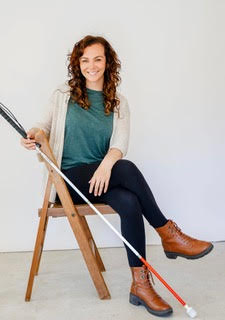During a recent Zoom meeting with our team, a colleague joked that her biggest concern in the current crisis was that she was having a hard time getting wine delivered. While we all laughed at her comical cry for help, the underlying message was a wake up call for me.
That colleague, like many of our colleagues here at Perkins, is blind. If anyone should have been clued into what she, and others in our community, may be needing help with during this crisis, it should have been me. Yet here I sat, listening, and realizing I was missing opportunities to be supportive, to be kind, to be a good teammate.
This post is an attempt to help all of us be better teammates. Not everyone who is visually impaired needs or wants help. This is not meant to be a battle cry to suddenly drop wine on the doorstep of every blind person you know (although, would any of them complain? Probably not!). What it is meant to do is get us thinking about everyone on our teams, and how we can support them in ways we might not already be thinking about.
Here are 10 things you can do, today, that could help those who want it. And if they don’t want it, that’s fine, too.
1. Reach out and ask
Your blind coworkers may be reluctant to ask for help. In our onsite work environment, we know our blind colleagues are like everyone else: they are valued members of our team who are fully capable of doing their work. That is still true. It is also true that in these uncertain times of constant change, they may need help with the things none of us could have planned for. They may not feel comfortable reaching out.
Don’t assume they need help. Ask. Don’t assume you know what they need. Ask. Don’t be afraid of overstepping. Do reach out.
2. Have specific offers
It’s nice to say, “What can I do?”. Many people will be too polite to tell you. If your colleague declines a general offer of help, get specific with your suggestions:
- Getting things from their office and delivering it to their home.
- Grocery shopping/delivery.
- Providing rides.
- Making and delivering masks.
- Dropping or having prepared meals delivered
3. Set up times to connect
Everyone is feeling isolated, and that is no different for people who are visually impaired, in fact, they are likely feeling it even more. Set up regular phone calls or video chats – a personal connection is much better than a check-in email.
4. Make sure your team’s remote work environment is accessible
As we all quickly translate to remote work, be sure what you are creating is accessible to everyone on your team. Be sure to think about any new project management software, meeting platforms, online content, etc. If you aren’t sure how to do this, just ask your visually impaired colleague for help or advice – she will have some.
5. Embrace the new world of video meetings
If your team, like the rest of humanity, has moved to video meetings, ask your teammate if they would like help setting up their shot. We don’t need to get fancy; you can talk them through what you are seeing, recommend things in the background be removed, let them know if their lighting is okay, and so on.
While we are talking about video meetings (and let’s include conference calls here), use everyone’s names. When you start talking, say who you are. If you have a question for the team, say it is for the entire team. If you are directing your question or comment to a specific person, say their name. Let the team know when you are leaving the call/meeting.
6. Give verbal space
Whether on the phone or in virtual meeting rooms, allow for verbal space. When we are all in one room it is easier for the team to know when someone has something to say. Now that we don’t have that option, we need to leave room for people to contribute. In a group call or virtual meeting, select a moderator to handle the “turn-taking” of speakers. Encourage “round table” conversations where each person has a chance to speak (or decline) on each topic/question.
7. Consider everyone’s workload
We are all facing new ways to work, and new tasks we didn’t have before. Are there things that are more challenging now for your colleague than they used to be? Could those tasks be swapped with something you or another team member are doing? If you think that could be helpful, ask.
8. Be flexible
Everyone is having to adapt right now. If a blind colleague asks you to do something differently than was done before, know there must be a reason. For all of us, working from home could be creating technical challenges or physical challenges that may require a workaround. Be ready to change up deliverables and embrace requests for adjustments to the way you used to do things.
9. Set up times for the team to socialize
Remember lunch with your coworkers? Those were good times. Take them online. Set up a time with your team that allows for catching up and for talking about life outside of work. Virtual lunches, happy hours (people can swap recipes for apps and drinks ahead of time), group challenges (have team members prepare a slide show about a fun, non-work thing they love or ask them to come prepared to show off a talent) – anything that gets your team talking and laughing together.
10. Be understanding. Be patient. Be there.
We are all scrambling to try and adjust to the new normal. Every day is filled with new challenges that require so much of our energy to overcome. The longer this goes on, the more we risk nearing our breaking point. Remember that your blind colleagues are very practiced at adjusting and adapting every day. For some, this may feel like just another day in conquering the world. For others, all this extra adjusting may be starting to feel like too much to handle. Ask, listen, help where you can, repeat.
And, when appropriate, deliver the wine.
Deana Criess is an Instructor and Applied Improvisation Specialist for Career Launch @ Perkins, a career training program for young adults who are visually impaired.
An educator with more than 20 years experience, she has worked in a wide variety of inclusive classrooms at the K-8, high school, college and professional development levels. She also brings to Perkins a pronounced funny bone, having spent the bulk of her career at ImprovBoston. Over her 10 years there, she created and implemented Customer Success programming for the organization’s corporate training arm, IBcreative, and pioneered a number of innovative comedy programs for diverse populations, including people with disabilities.



